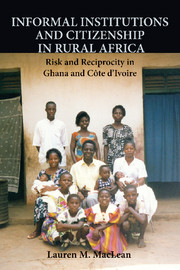 Informal Institutions and Citizenship in Rural Africa
Informal Institutions and Citizenship in Rural Africa Published online by Cambridge University Press: 05 May 2010
The informal institutions of reciprocity differed in puzzling ways in these similar Akan villages on either side of the Ghana–Côte d'Ivoire border. More people were participating and exchanging significantly higher quantities of help, but to a narrower group of social ties in the Ivoirian region than in the Ghanaian one.
But the variation in informal reciprocity was not the only surprise I found during my stay in these four villages. Elders in these regions told very different stories about the village chiefs during the colonial era and how they responded to the hard times of the Great Depression. In the Ghanaian villages, elder respondents recalled how their chiefs were powerful and sometimes organized resistance to disliked British colonial policies. In contrast, in the Ivoirian villages, older residents remembered their chiefs as representing French colonial interests, frequently describing the chiefs' participation in conscribing forced labor.
As I conducted my fieldwork, I then recognized legacies of the past in the different response to everyday problems in the two regions. In the Ghanaian villages, residents approached the village-level unit committee and/or the village chief to resolve an urgent problem. Meanwhile, in the Ivoirian villages, people reported a problem to the sous-préfet, located more than an hour away, or sought even more distant advice from a “big man” in Abidjan.
In this next part of the book, I analyze the connections between these puzzling differences in state-building and reciprocity.
To save this book to your Kindle, first ensure [email protected] is added to your Approved Personal Document E-mail List under your Personal Document Settings on the Manage Your Content and Devices page of your Amazon account. Then enter the ‘name’ part of your Kindle email address below. Find out more about saving to your Kindle.
Note you can select to save to either the @free.kindle.com or @kindle.com variations. ‘@free.kindle.com’ emails are free but can only be saved to your device when it is connected to wi-fi. ‘@kindle.com’ emails can be delivered even when you are not connected to wi-fi, but note that service fees apply.
Find out more about the Kindle Personal Document Service.
To save content items to your account, please confirm that you agree to abide by our usage policies. If this is the first time you use this feature, you will be asked to authorise Cambridge Core to connect with your account. Find out more about saving content to Dropbox.
To save content items to your account, please confirm that you agree to abide by our usage policies. If this is the first time you use this feature, you will be asked to authorise Cambridge Core to connect with your account. Find out more about saving content to Google Drive.